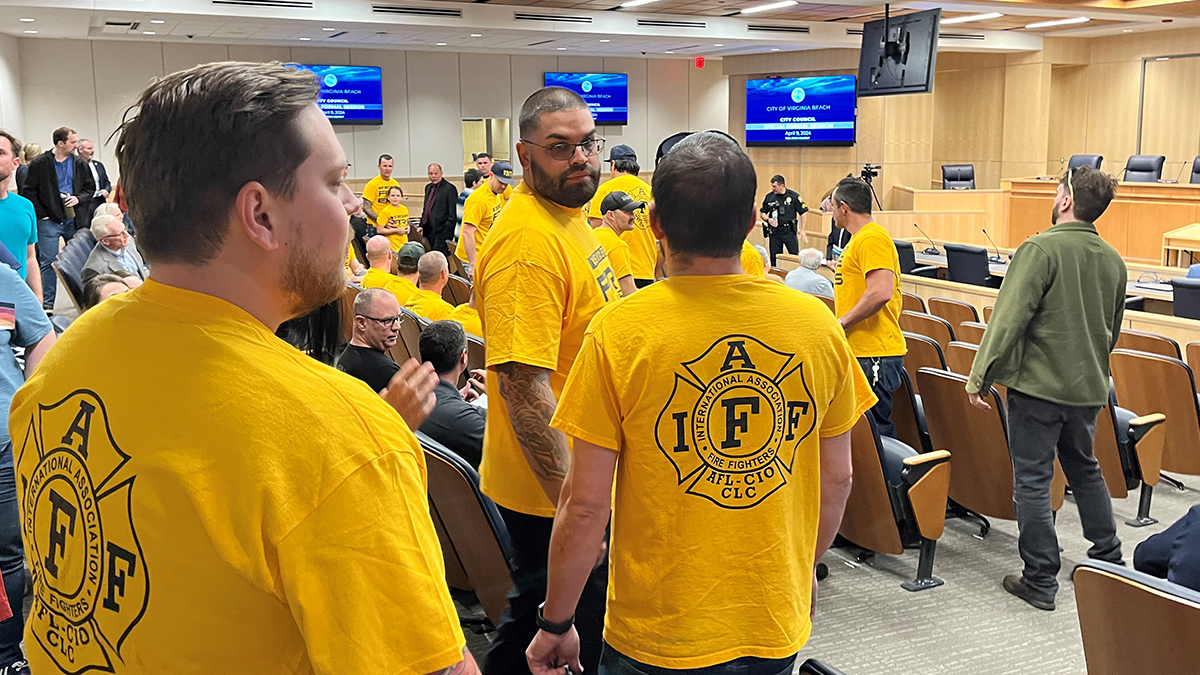
A safer workplace. A voice at the table. Investment in the workforce.
That's what city employees and several residents told Virginia Beach's City Council fire and EMS staff would get if the city allows them to collectively bargain.
Resident Cody Connor said the city has no problem spending money on something like the Jackalope extreme sports festival.
“We can do a skateboard festival for a weekend, but we can’t afford the money on improving the lives of the people at the other end of the 911 call, who put the fire out to save your lives, the people you depend on in your most dire moments?” Connor asked the city council.
The International Association of Fire Fighters petitioned the city in February to allow the union to bargain on behalf of the city’s fire and rescue employees, starting the clock on the city’s response.
The council didn’t indicate how it would vote at Tuesday’s meeting.
It’s planning a closed-door discussion about the request at its April 16 meeting and will likely bring the issue to a vote in the coming weeks.
For decades, public sector bargaining was illegal in Virginia in an effort to weaken unions.
State law changed in 2021 allowing local government workers to collectively bargain. The law requires employees to get permission from city or county leaders first.
Virginia Beach human resources staff told the council in February it would take nearly $1 million to update the pay system to handle paystub changes as a result of union bargaining and to hire staff to deal with union and contract negotiations.
Some council members said they needed to know more about the process or expressed concerns about how much it would ultimately cost the city. Mayor Bobby Dyer cited his home state of New Jersey, which is known for strong unions.
“The cost of that is staggering, to the point [that] taxes are through the roof, so we’ve just got to approach with caution,” Dyer said.
Many city workers pushed the council to approve collective bargaining, as did the overwhelming majority of other speakers, including former city fire chief Steve Cover and ex-police chief Jim Cervera.
Proponents said the cost would be a drop in the bucket of the city’s $2.6 billion budget and would let the city better hire and retain critical city staff.
Some residents had concerns.
Diana Howard, who heads the Virginia Beach Tea Party, worried that the city council would lose control of its own budget under threat of a striking workforce.
“Collective bargaining is adversarial at its core,” Howard said. “Unions in other localities are threatening to walk out over what's in their ordinances. They're talking about working to rule, doing work slow downs, calling in sick. It’s not about customer service.”
The Virginia law allowing public-sector bargaining does not allow those employees to strike.
A Virginia Beach task force convened last year recommended what topics should be on the table for bargaining, including wages, health insurance premiums and various non-monetary working conditions.
A 2021 study by The Commonwealth Institute, a progressive advocacy group, shows Virginia Beach City employees struggle to earn enough to live in the city where they work.
Several cities in Virginia have authorized employees to collectively bargain, mostly concentrated in Northern Virginia. Locally, cities’ approaches have been mixed.
Portsmouth became the first locality in Hampton Roads to allow its city employees to collectively bargain when it approved bargaining rights citywide in November.
That same month, Norfolk City Council denied a request for bargaining rights from its police union.




